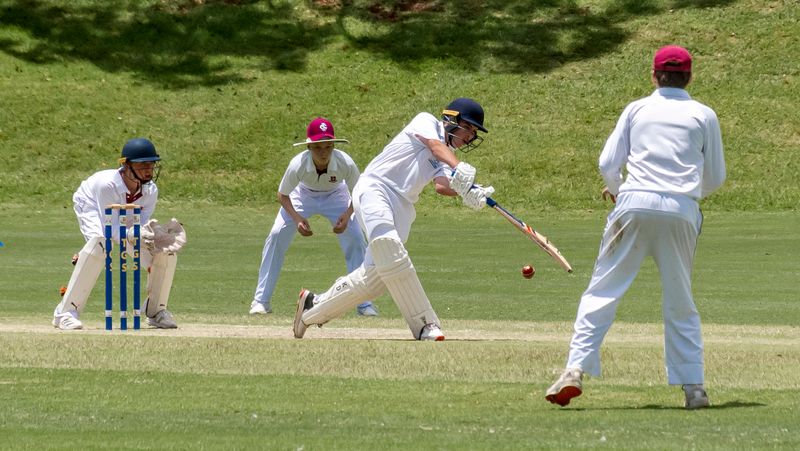“Many of the respondents spoke of controlling the controllables across six broad themes: Consistency and Routine, Using Study Tools, Environment Control, Intrinsic Motivation, Resilience and Perspective.”Mrs Crystal Hede, Director of Learning and Innovation

Giving students the opportunity to cope with disappointment has the capacity to shape their good character.
Schools are inherently hopeful and happy places. Their natural focus on growth, connectedness and preparing youth for a better future creates an optimistic atmosphere in which ambitions are born. These positive emotions and experiences lay the foundation for our expectations and while these can be highly motivating, they come with a catch: the greater our expectations, the greater the disappointments, too.
Disappointment is not a popular feeling. Rightly so, not many of us wish to feel sad, displeased or frustrated by the non-fulfilment of our hopes or expectations. However, in an academic setting, disappointments are inevitable and they can manifest in various forms. Commonly, students can find it hard to understand a concept that they see their peers comprehending and receive a lower-than-desired assessment result. Even worse, they can feel “robbed” of a grade that they believed to be rightfully theirs, not be with their preferred teacher, fall short of the required points for an academic award and face unexpected obstacles that disrupt their learning. Invariably, students will experience one or more of these things at some point in their schooling, possibly all of them, often.

For parents, it can be incredibly difficult to watch our children experience these things, especially when they result in further negative emotions such as shame or self-loathing. Sometimes, the worry we feel for our children is almost unbearable and it is natural to want to fix the problem for them. Prominent clinical psychologist, Dr Judith Locke is a leading voice on this topic. In her article, Kids need to fail. And parents need to let them; she says, “When your child is disappointed, it’s understandable you want them to feel better immediately, but taking temporary bad feelings away makes your child less capable to face inevitable trickiness in the future.” Locke goes on to say, “While I know it feels awful to watch your child be disappointed or sad, every time you help them avoid those feelings, you also sidestep them learning essential skills of resilience and a belief they will cope if life doesn’t always go their way.”

For these reasons, we will not shield students from experiencing disappointment at TGS. Doing so would be detrimental to their development and this fails to prepare them for the realities of life. Most importantly, giving students the opportunity to cope with disappointment has the capacity to shape their good character. As beautifully put by Irish politician Sir Boyle Roche, “Disappointment is the nurse of wisdom.”
I sought the wisdom of some of our older TGS students who have learned to manage their disappointments over time and even harness them for good. Specifically, I surveyed recipients of diligence awards because these recognise dedication and resilience rather than grades. All the respondents admitted to encountering setbacks and shared various versions of not letting these deter their efforts. One of the seniors said, “When faced with disappointment, I use ‘failure’ as a motivator to strive for improvement and apply the feedback I receive to make adjustments for the future.”
- Consistency and Routine: Diligent students emphasised the importance of sticking to a structured study schedule. They often study at the same time every day and for consistent durations to build a habit of regular learning.
- Using Study Tools: Many of these students use study trackers, whiteboards and diaries to reinforce learning and ensure they systematically cover all necessary material.
- Environment Control: They create and maintain separate spaces for study and relaxation to condition their minds for productive work when in the study zone. This includes removing any electronic devices from the study area.
- Intrinsic Motivation: Consistently, the diligent students spoke of a strong internal drive to improve and put in the effort required to overcome academic hurdles. This includes proactively seeking clarification or help.
- Resilience: Their responses demonstrated resilience in the form of a “bounce back” mentality. They spoke of accepting that not all decisions will be to their liking (for example, class allocations), acknowledging their negative emotions and then moving on in order to stay focused on their learning.
- Perspective: Maturely, some of the boys spoke about managing their expectations. While hopes and dreams can be powerful motivators, it’s important to balance them with realistic expectations to maintain a healthy mindset.
TGS Old Boy (2011-13) and 2024 Paris Olympic medalist, Matthew Denny recently spoke with our students, sharing some anecdotes and advice that aligned with the above sentiments. He said that one of the biggest things he learned from his career was that “Success lies on the other side of discomfort. You just need to step toward it and keep moving.” Matthew’s wise words support the notion that disappointment — a form of discomfort — is a natural and expected part of life that forms our character as we strive towards our goals and aspirations. With this in mind, our TGS boys need to keep dreaming but expect that disappointment will occur. They need to keep moving and trying and see disappointment as an opportunity for learning.
Reference
Locke, J. (2019, March). Kids need to fail. And parents need to let them. The Courier Mail. Retrieved September, 2024, from https://www.couriermail.com.au/rendezview/kids-need-to-fail-and-parents-need-to-let-them/news-story/5df007cfd72f50b4a22b03c39c127781
Latest Blog
The Silent Epidemic: Unveiling the Consequences of Sleep Deprivation
“Sleep that soothes away all our worries. Sleep that puts each day to rest. Sleep that relieves the weary laborer and heals hurt minds.” William Shakespeare (Macbeth, 1606) Heart Disease, Cancer, and Alzheimer's. Three life-threatening diseases. Three diseases all linked to lack of sleep. According to Dr. Okorie from the children’s health division of Stanford University, “7 out of 10 high school students are falling short of… (sleep) on school nights.” The Bulk of American teens are not getting…
Tik Tok - From Fun to Fear
Social media platforms have ingrained themselves into our daily lives in a time when technology is constantly evolving and drawing millions of users with seductive features and never-ending streams of captivating content. Among these, TikTok has become a worldwide phenomenon, captivating users with its viral challenges and short-form films. Underneath the fun and inventiveness however, there is growing concern about the risks connected to TikTok and other social media platforms. TikTok's…
Active Procrastination – Unlocking the Gates of Time
“Procrastination is like a credit card: it’s a lot of fun until you get the bill.” - Christopher Parker – professional actor. Unfortunately, procrastination is a term that we are all familiar with as students; the vast majority of us have experienced it firsthand. It saps our time and results like a parasite, a burden on its host. However, despite it’s reputation, recent studies have shown that when harnessed correctly, procrastination can be a powerful tool to improve both academic efficiency…
It Takes a Village...
The Toowoomba Grammar School Boarding community plays a pivotal role in shaping the young minds of our boarders and instilling values whilst creating a sense of mateship that can last a lifetime. The nurturing and supportive network of staff not only ensure a safe and structured environment but also cultivates a sense of belonging and camaraderie among the boys. ‘The staff supply the fuel to the ship but ultimately it is the boys who steer it and decide upon its final destination’. Our TGS…
Unlocking Literacy - The Big Six Elements for Your Child’s Reading Success
Literacy skills are a core component of each day for our students, and parents often ask how they can support this from home. I am delighted to share with our parent community the essential components that underpin successful reading development. These elements, known as the Big Six, provide a solid foundation for your son’s literacy journey. These critical building blocks include: Oral Language: Communication skills are the bedrock of reading. Encourage rich conversations with your child.…
The Journey of a Boarding Mother
When you look up mother in the dictionary it reads: female parent of a child. When you look up boarder, it simply reads: a child who lives away from home. So, put “boarder mother” together and we have: the female parent of a child who lives away from home – if only it were that simple. My definition of boarding mother is: a strong, dedicated unbelievably great female parent of a child who has the wisdom to put her son’s educational needs, wellbeing and lifelong endeavours before her own. A…
The Importance of Differentiation
As parents, we all want our children to have the best possible education, and one of the most effective ways for teachers to provide this is through differentiation. Differentiation means tailoring instruction to meet the unique needs and interests of each student, and it can take many forms. First, let's define differentiation. Differentiation is a teaching approach that recognises that students have different strengths, interests, and learning styles. By adjusting instruction to meet these…
Addressing Anger in Teenage Boys
As a community dedicated to the growth and well-being of our teenage boys, it is essential to address the complexities of emotions we experience during adolescence. Among these emotions, anger stands out as a powerful and intense feeling that can influence their behaviour, relationships and overall wellbeing. Untreated anger can lead to a myriad of problems and challenges for our young boys. In this comprehensive guide, we will explore the dangers of untreated anger, ways to support healthy…
Study Skills Program
Just as teachers benefit from an understanding of the Learning Sciences in their lesson planning and preparation, so to do students when they are studying for major summative assessments. A survey of TGS students in Years 9 to 12 found that 70% of our boys felt that they knew how to study, with the biggest impediments to study being lack of motivation and too many distractions. The most highly preferred study technique was found to be rewriting notes. Cramming, rereading the text and rewriting…